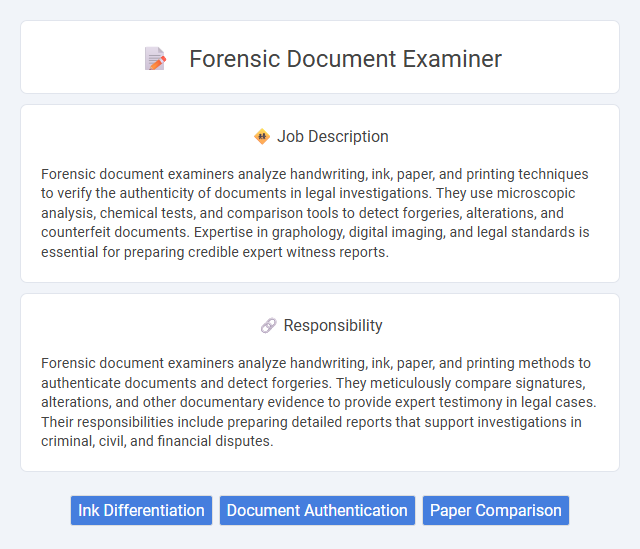
Forensic document examiners analyze handwriting, ink, paper, and printing techniques to verify the authenticity of documents in legal investigations. They use microscopic analysis, chemical tests, and comparison tools to detect forgeries, alterations, and counterfeit documents. Expertise in graphology, digital imaging, and legal standards is essential for preparing credible expert witness reports.
Individuals with strong attention to detail and a high level of patience are likely to be suitable for a forensic document examiner role, as the job requires meticulous analysis of handwriting and documents. Those with a calm demeanor under pressure and an analytical mindset may also find success in this field, given the importance of accuracy in legal contexts. People who struggle with repetitive tasks or prefer fast-paced work environments might find this job less compatible with their personal strengths.
Qualification
A forensic document examiner must possess specialized training in handwriting analysis, ink and paper comparison, and document authentication, often obtained through accredited programs or certifications such as those from the American Board of Forensic Document Examiners (ABFDE). Candidates typically hold a degree in forensic science, criminal justice, or a related field, complemented by extensive practical experience in forensic laboratories or law enforcement agencies. Strong attention to detail, analytical skills, and knowledge of legal procedures are essential qualifications for accurately interpreting and presenting document evidence in court.
Responsibility
Forensic document examiners analyze handwriting, ink, paper, and printing methods to authenticate documents and detect forgeries. They meticulously compare signatures, alterations, and other documentary evidence to provide expert testimony in legal cases. Their responsibilities include preparing detailed reports that support investigations in criminal, civil, and financial disputes.
Benefit
Forensic document examiners likely provide significant benefits by ensuring the authenticity and integrity of critical documents, which helps prevent fraud and supports legal investigations. Their expertise probably enhances the accuracy of evidence presented in court, contributing to fair judicial outcomes. Employers may also benefit from reduced risk and increased trust in document verification processes.
Challenge
Forensic document examiner jobs likely involve complex challenges such as analyzing handwriting, ink, and paper to detect forgeries or alterations. The probability of encountering ambiguous or highly sophisticated counterfeit documents often requires advanced analytical skills and meticulous attention to detail. These challenges may demand continuous learning and adaptation to evolving forgery techniques.
Career Advancement
Forensic document examiners can advance their careers by obtaining certifications from recognized bodies such as the American Board of Forensic Document Examiners (ABFDE). Gaining expertise in advanced handwriting analysis, ink and paper examination, and digital document forensics enhances professional credibility and opens opportunities in federal agencies or private consulting. Pursuing specialized training and contributing to forensic research can lead to leadership roles and higher-paying forensic investigation positions.
Key Terms
Ink Differentiation
Forensic document examiners specialize in ink differentiation to detect alterations, forgeries, and authenticity in handwritten or printed documents by analyzing ink composition and drying patterns using techniques like thin-layer chromatography and spectroscopy. This process is crucial for legal investigations, providing objective evidence on document integrity and chronological sequencing of entries. Proficiency in advanced ink analysis methods enhances accuracy in distinguishing between inks from different sources and manufacturing dates.
Document Authentication
Forensic document examiners specialize in the authentication of documents by analyzing handwriting, ink, paper, and printing methods to detect forgeries or alterations. They employ advanced techniques such as microscopic analysis, spectral imaging, and chemical testing to verify the originality and integrity of questioned documents. Their expertise is crucial in legal investigations involving disputed contracts, wills, identification papers, and financial records.
Paper Comparison
Forensic document examiners specialize in paper comparison by analyzing the physical and chemical properties of documents to verify authenticity and detect alterations or forgeries. They utilize techniques such as microscopy, spectral analysis, and chromatography to examine paper fiber composition, watermarks, thickness, and ink interaction. This detailed comparison supports legal investigations by providing objective evidence regarding the origin and validity of questioned documents.
 kuljobs.com
kuljobs.com